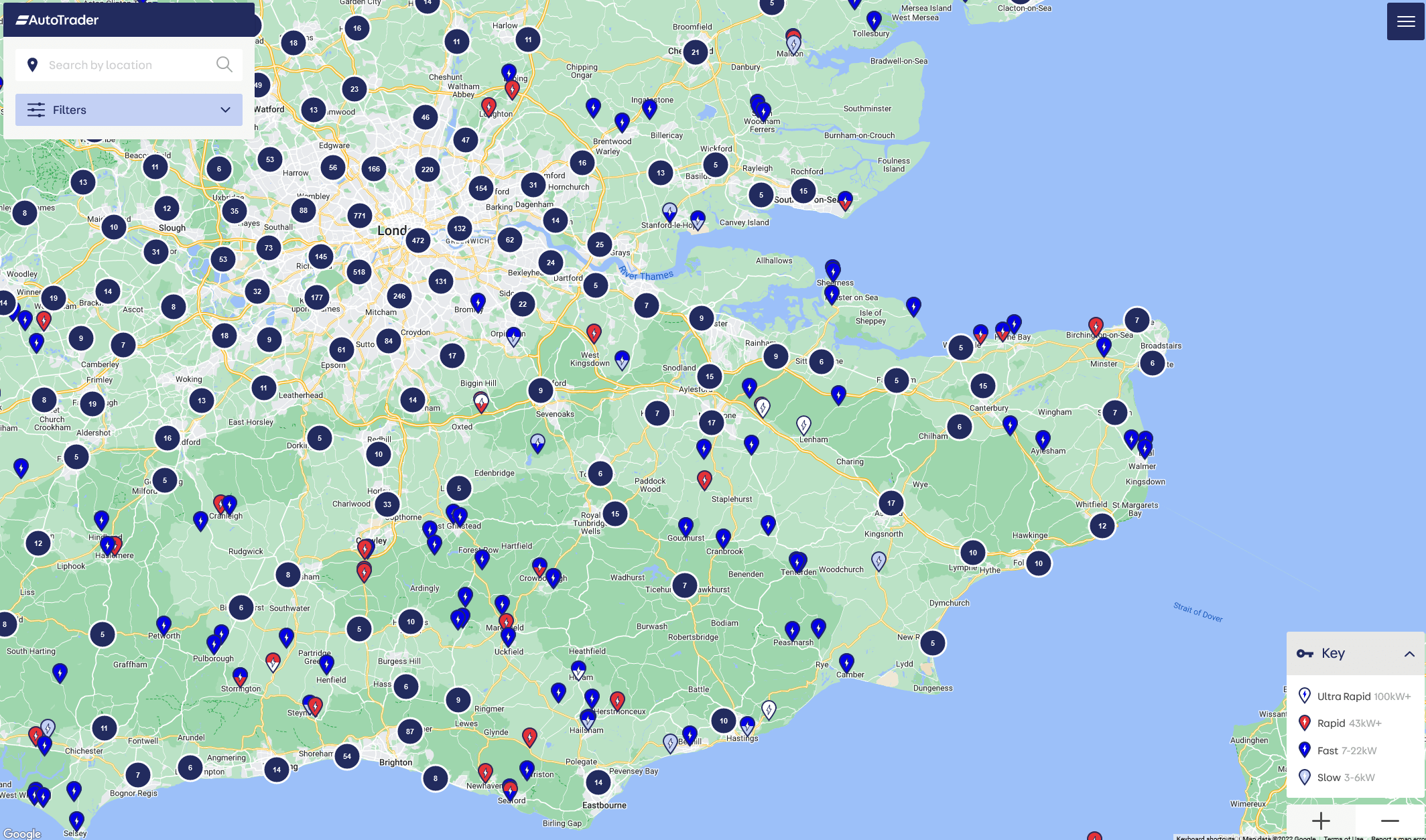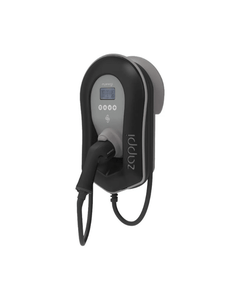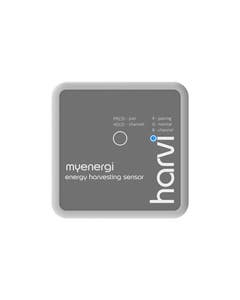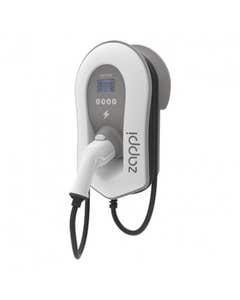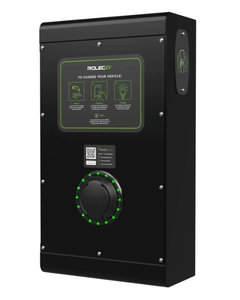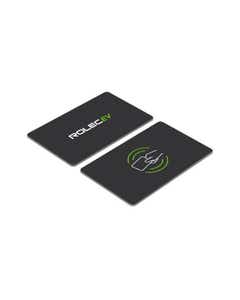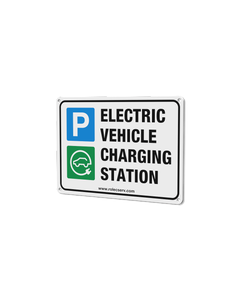Electric Vehicle, Car Chargers (EV Chargers) - Comprehensive FAQ
We know that the world of Electric Car Chargers can be daunting, with lots of different information out there to read and digest. Regardless of whether you’re fitting an Electric Vehicle Charger in a residential or commercial setting, you’ll need to know things like which type of EV Charger is best for your installation, whether or not to choose a tethered or untethered Charger, how much power an EV Charger draws, the type of cabling needed, what government grants you can get, and much more.
Our customers often need advice and guidance on their Electric Car Charger installation, so we explore the most frequently asked questions below; if you still have any questions after reading through this page, please don't hesitate to contact us on 01424 220384 where our friendly experts will be happy to help you.
Are Electric Car Chargers Standardised, What Types are Available?
We often get asked if all Electric Car Chargers are the same and the answer is NO. The different types of EV chargers typically refer to the connector types used for charging electric vehicles. Each connector type has its own specifications and is compatible with different charging infrastructures and electric car models; so keep in mind there is no universal Charger Type. AC Electric Car Chargers, like those we sell, come in three distinct types; Type 1, Type 2 & Type 3.
What is the difference between Type 1 Type 2 and Type 3 EV Chargers?
With so much to learn about EV Charger Types, we have created a table below to make it easier to understand the differences between each option.
Mobile users turn horizontal
CONNECTOR TYPE |
POWER RATINGS |
FEATURES |
IMAGE |
|
Type 1 EV Charger (Older Type) |
3.3kW & 7kW |
|
|
|
Type 2 EV Charger (Most Common) |
3.3kW, 7kW & 22kW (3 Phase) |
|
 |
|
Type 3 EV Charger (Scame Connector/DC Fast Charger) |
Over 40kW |
|
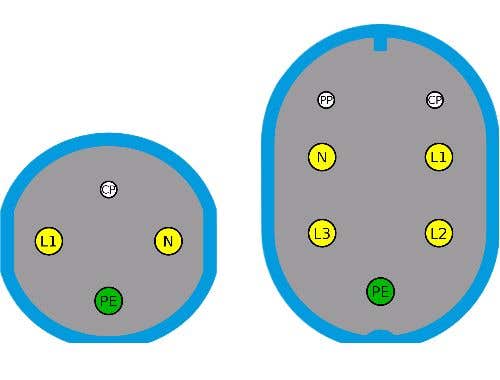 |
If you’re unsure as to what connection type you need for your home or business EV charger, read our EV Charger Buying Guide, or get in contact with our friendly sales team on 01424 220384.
How Much Does an Electric Car Charger Cost?
Home or workplace Electric Car Chargers can vary in price but they typically start at around £400 to £500 and can go up to £4000 depending on power output and features etc. If you only use public and paid chargepoints, you could save in the region of £1000 over a year with a home chargepoint. Despite the initial costs, they often pay for themselves quite quickly. Here at Electrical2Go we stock a wide array of EV Chargers that all offer different benefits and rewards with varying price ranges, so you can always find the perfect EV Charger for your car!
Don’t forget, the government OLEV grant can save you £350 off the cost of a charger and/or installation. For more information, read our Guide to the OLEV EV Grant.
How much does it cost to install an EV Charger?
There are some factors to consider that will contribute to the cost of an EV Charger installation.
- EV Charger - The cost of the installation will encompass the specific EV charger being installed, considering its features, power capacity, and any additional hardware or components required for seamless integration.
- Home Electrical System - The cost of the installation will also include consideration for the impact on the home's electrical system, ensuring it can handle the power requirements and necessary adjustments for safe and effective operation. Considering the home's electrical system, the installation cost will account for any necessary upgrades or modifications to ensure the safe and optimal functioning of the EV charger within the existing electrical infrastructure. This may involve assessing the capacity of the electrical panel, potential wiring adjustments, and compliance with local building codes and regulations.
- Home Construction - If you happen to reside in a historic residence with thick stone walls measuring three feet in thickness, the amount of time, attention, and exertion required to drill through them will have an impact on the overall expenses associated with the installation process.
- Electrician Installation - Then of course needing a qualified electrician to quote then carry out the necessary adjustments to your home in order to install the EV Chargepoint.
Everybody’s circumstances and installation requirements are different so we can’t put a definitive cost on this. However, if you’re unsure, don’t hesitate to contact our friendly sales team. Although the initial setup cost of your personal EV Chargepoint is high, this will pay itself off relatively quickly. This combined with the fact that the infrastructure around the country is constantly growing there is no better time then to upgrade and treat yourself to your own Car Charger then today!
Is it safe to install an electric car charger at my home or business property?
Electric car chargers need to be installed by a professional electrician or an OLEV approved installer, and there are associated costs with this. A professional installer will be able to tell you whether you need permission to install your EV charger, whether your home or commercial property is safe, and where is best to place the EV charging unit itself.
Your electrician will be able to determine whether your existing wiring and electrical supply will be able to handle the power delivered to the EV charger. Your installer will also have to inform the District Network Operator that a charging unit is being installed in the area.
What is a Tethered Electric Car Charger?
A tethered Charger simply means that the Charger comes with a cable that is already attached - and cannot be unattached. There is also another type of Car Charger known as an untethered Charger. Which does not have an integrated cable and so the user/driver will need to sometimes purchase this separately (other times it comes with the Charger), and simply plug their vehicle in to start charging the vehicle battery.
What is the difference between a tethered and untethered EV Charger?
A big distinction between EV chargers is whether they’re tethered or untethered. A tethered electric car charger has an integrated charging cable. In simple terms, that means the cable is permanently attached to the wallbox, as mentioned above.
An untethered electric car charger has a socket in which you plug the charging cable into, much like a camping socket. Both types of Chargers offer different benefits and obstacles, this will be dependent on the user/driver on which will best suit their situation. At Electrical2Go, we stock both types of EV charger to suit your needs.
Should I choose a tethered or untethered EV Charger?
Tethered and untethered electric vehicle chargers each have their pros and cons.
Tethered Charger
Tethered Charger Pros
- Tethered electric chargers allow you to simply park up and plug in
- You can keep your other charging cable in the boot of your car
- More secure than an untethered unit
- You don’t need to buy an additional cable
Tethered Charger Cons
- Cables often come in fixed lengths, so you can’t buy a replacement if needed
- They lock you into the Type 1/Type 2 choice. If you change car, or even if a newcable standard emerges, you’ll need to buy a new charger or an adapter
- They aren’t as ‘neat’. The cables are permanently on display and you’ll have to coil/uncoil every time you use it.
Untethered Charger
Untethered Charger Pros
- You can buy multiple cables of different lengths
- Much more flexible and future-proofed, you are not as locked into the Type 1/Type 2 choice, either type can use the socket
- As EVs become more popular, visiting friends and family can also use the charger
Looks a lot more discreet and tidy on your driveway or car park
Untethered Charger Cons
- You have to get the cable out of your boot/garage every time you want to charge
- Less secure than a tethered unit
- You may have to supply your own charging cable
Which Home EV Charger Should You Choose?
Home EV Chargers fall into 2 categories; Trickle Chargers and AC Chargers.
Home Trickle Charger
A Trickle Charger plugs into the mains supply using a standard, 220V 3-pin plug on one end. A Trickle Charger can deliver anywhere between 8-10 miles of range to the battery per hour. They are not overly practical unless you only drive short distances every day, or top-up every night as it can take anywhere from 12 - 24 hours to fully charge a battery pack.
Home AC Charger
AC Chargers (sometimes known as Wallboxes) are a much better option for most EV owners and are often installed in homes, offices, and other commercial settings. These Electric Car Chargers have power outputs of 3.7kW or 7kW. The latter will charge most EVs from empty to full range in around 8-10 hours.
For Commercial Settings:
Commercial settings with a 3-phase power supply can also install 22kW Electric Car Chargers with even quicker charge times, these are known as DC Chargers.
What is a Smart EV Charger?
A smart EV charger is one that shares data between the charger, the car, and you. This is typically done via an app or web service. A smart EV charger allows you to control the charging process by doing things like:
- Setting charging times for low-demand (and therefore lower cost and often greener) periods
- Managing charge levels of your car
- Monitoring how much energy and money you’ve spent over a given period
- Ensure your charger receives regular software or firmware updates for the latest features
- Integrating with other smart home products or home green energy solutions such as solar panels or wind turbines
- Offering remote diagnostics and resolution
What is an EV Fast Charger?
An EV Fast Charger is an Electric Car Charger that can charge your car’s battery from empty to nearly full in around 40 minutes. These EV charging solutions are in public places (such as motorway service stations or dealerships) and using DC, deliver anywhere from 50kW to 200kW of power. Due to their very high installation cost and power consumption, they are not economical for homes or most workplaces.
How fast can an EV Charger charge my car?
There are several factors that will impact the time it takes for an Electric Car to charge from an EV Charger, these include: Size of Car Battery, Max Vehicle Charging Rate and the Max Chargepoint Charging Rate. See the table below for a rough outline on charge times.
Mobile users turn horizontal
Miles of Range Added per Hour of Charging
|
3.7kW Slow |
7kW Fast |
22kW Fast |
43-50kW Rapid |
150kW Rapid |
| Up to 15 Miles | Up to 30 Miles | Up to 90 Miles | Up to 90 Miles in 30 Minutes | Up to 200 Miles in 30 Minutes |
Do I Need Permission to Install an Electric Car Charger?
Generally, you don’t need permission to install an Electric Car Charger at home or in a workplace. However, you will need to get permission if any of the following apply:
- If the charger is near a highway
- The charger is more than 1.6m high
- If it is over 0.2 cubic meters
- If it is being installed on or in a listed building
In rented private or commercial property, you may also need permission from your landlord.
Where Can I Install an Electric Vehicle Charger?
EV Chargers are weatherproof so people typically install them on their sides of their homes by the driveway, or inside a garage. Given that most EV charging cables are between 5 and 10m long, you need to consider where you park most regularly. Once you have a qualified installer round to check, they will be able to clarify and ensure the spot chosen is safe and optimal for use.
To qualify for an OLEV grant, you need to have off-street parking.
What is the OLEV or Plug-In Grant?
The OLEV grant, or the Electric Vehicle Homecharge Scheme (EVHS) to give it its full name, is a government EV charger grant worth up to £350 to be used against the purchase and installation of a home Electric Car Charger. You can claim the grant for one charger per eligible vehicle, old or new, up to two vehicles per household.
To qualify for the OLEV grant you must:
- Have off-street parking
- Install an OLEV-approved chargepoint
- Use an OLEV-approved installer
What is OLEV?
OLEV stands for the Office for Low Emission Vehicles which is part of the UK Government’s Department for Transport. They work across the government to support the introduction and building of infrastructure of Ultra Low Emission Vehicles (ULEV).
For more information, read our Guide to the OLEV EV Grant.
If you’re planning to install an EV Charger at a place of business, the Workplace Charging Scheme (WCS) is also available. See below for more information.
What is the Workplace Charging Scheme (WCS)?
Like the EVHS, the Workplace Charging Scheme (WCS) is a grant that a business can use against the cost of installing electric car chargers at a place of business, for use by their staff or fleet cars, by up to £14,000. Businesses, charities, or public authorities can claim up to £350 per chargepoint socket, up to a limit of 40 sockets. To qualify for the WCS, you need to have sufficient off-street parking and have the chargepoints installed by an OLEV-approved installer. You’re not currently required to have EVs as part of your fleet, but you do need to demonstrate an existing or future need for the business. You also can’t retroactively claim for any chargepoints previously installed.For more information, read our Guide to the OLEV EV Charger Grant.
Where are EV Charging Stations Near Me?
Need to charge on the road? Check out this really useful fully interactive map from Auto Trader to find an EV charger close to you: Visit Interactive EV Charger Map. You will find many kinds of Charging Stations, at a variety of locations with different types of costs all across the UK.
